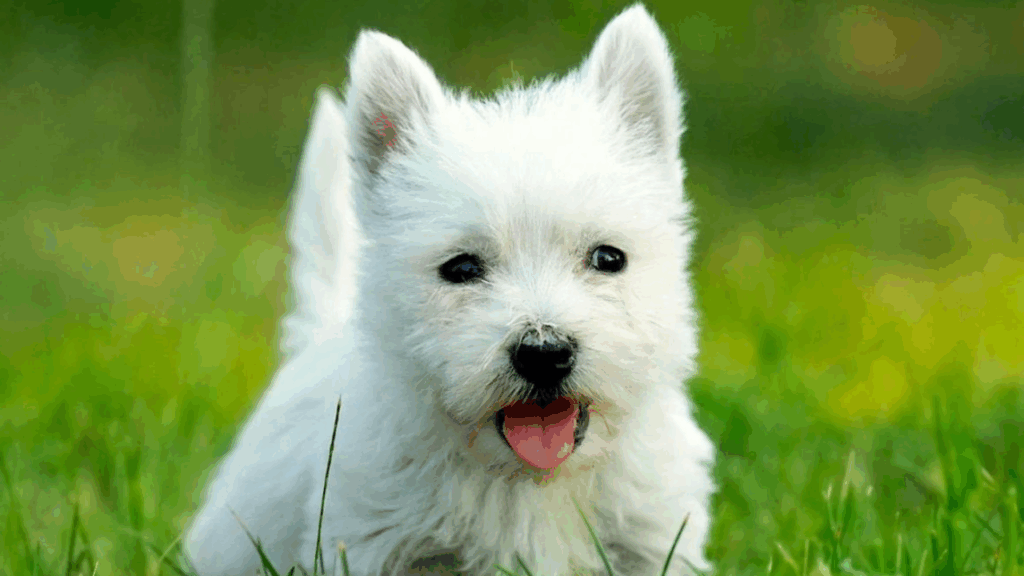The West Highland White Terrier, affectionately known as the “Westie,” is one of the most beloved small terrier breeds in the world. Recognized for its iconic white coat, sturdy build, and exuberant personality, the Westie combines charm and courage in a compact package. This breed brings together the best qualities of a terrier—bravery, intelligence, and independence—with an affectionate and friendly nature that wins hearts in households around the globe.
Origins and History
The West Highland White Terrier hails from Scotland, where it shares ancestry with other Scottish terriers such as the Cairn Terrier, Scottish Terrier, and Dandie Dinmont. Originally bred for hunting small game like rats, foxes, and badgers, the Westie was prized for its ability to go underground and its fearless attitude.
The breed’s white coat was selectively bred for in the 19th century to make them more visible in the field. Legend has it that Colonel Edward Donald Malcolm began breeding only white dogs after accidentally shooting one of his darker-colored terriers during a hunt. The breed was officially recognized by the Kennel Club in the early 20th century and has remained a favorite in the show ring and in homes ever since.
Appearance
The West Highland White Terrier is a small but sturdy dog, with a distinctive white double coat and a confident posture.
Key physical traits include:
- Height: 10–11 inches (25–28 cm)
- Weight: 15–22 pounds (7–10 kg)
- Coat: Harsh, straight outer coat with a soft, dense undercoat
- Color: Always white
- Face: Dark, almond-shaped eyes with a black nose and upright ears give them a keen and alert expression
Despite their size, Westies carry themselves with a bold presence, as if they are larger than life.
Temperament and Personality
Westies are known for their spirited, confident, and friendly demeanor. They are classic terriers—feisty, inquisitive, and sometimes a little stubborn—but their bright and engaging personality makes them highly lovable.
Notable temperament traits:
- Playful and energetic: Always ready for a game or adventure.
- Affectionate: They love being part of the family and form close bonds.
- Independent: They like doing things their own way, which adds to their charm.
- Alert and vocal: Westies make good watchdogs but can be prone to barking if not trained.
With the right guidance and socialization, they get along well with children, other dogs, and even cats, especially if raised together.
Exercise and Training
West Highland White Terriers are lively and active, requiring regular physical and mental stimulation.
Exercise needs:
- 30–60 minutes of daily activity
- Enjoy walks, play sessions, and secure outdoor exploration
- Thrive on interactive games and puzzle toys
Westies are intelligent but may test boundaries, so training should be consistent, firm, and positive. Early socialization is key to curbing any potential stubbornness or possessiveness. They respond well to reward-based training but may get bored with repetition, so variety helps keep them engaged.
Grooming and Maintenance
The Westie’s beautiful white coat requires regular grooming to keep it looking its best.
Grooming essentials:
- Brushing: 2–3 times per week to prevent matting and remove dirt
- Bathing: Every few weeks or as needed
- Trimming: Regular trimming or hand-stripping to maintain coat texture and shape
- Ears and nails: Regular cleaning and trimming
While not a heavy shedder, Westies are not considered hypoallergenic. Their coat tends to repel dirt, but they can get messy after play or outdoor adventures.
Health and Lifespan
West Highland White Terriers are generally healthy, with a lifespan of 12–16 years. Like all breeds, they can be prone to certain health issues.
Common concerns:
- Skin conditions, particularly allergies (often referred to as “Westie itch”)
- Patellar luxation (loose kneecaps)
- Hip dysplasia
- Dental problems (regular brushing helps)
Choosing a reputable breeder who screens for genetic conditions can reduce the risk of these issues. Regular vet check-ups and a proper diet also contribute to a healthy, long life.
Ideal Home and Environment
Westies adapt well to both apartment living and houses with yards. They are content as long as they get enough attention, exercise, and stimulation. They do not tolerate being left alone for extended periods and may become vocal or mischievous if bored.
Best suited for:
- Active individuals or families
- Seniors seeking a loyal, manageable companion
- Homes that enjoy play, training, and occasional grooming
They’re wonderful travel companions and enjoy being included in family activities.
Conclusion
The West Highland White Terrier is a compact powerhouse of personality, affection, and courage. With their iconic appearance and cheerful spirit, Westies win over everyone they meet. They are spirited without being aggressive, independent without being aloof, and loving without being clingy. For anyone seeking a small dog with a big heart and a bold soul, the Westie is a perfect choice.

Andy Parker is a dog lover, writer, and senior editor at BarkPicks. With years of experience covering canine health, training, and gear, he helps pet parents make smarter choices for happier, healthier dogs. Andy shares his home (and heart) with two rescue pups, Charlie and Mia.



